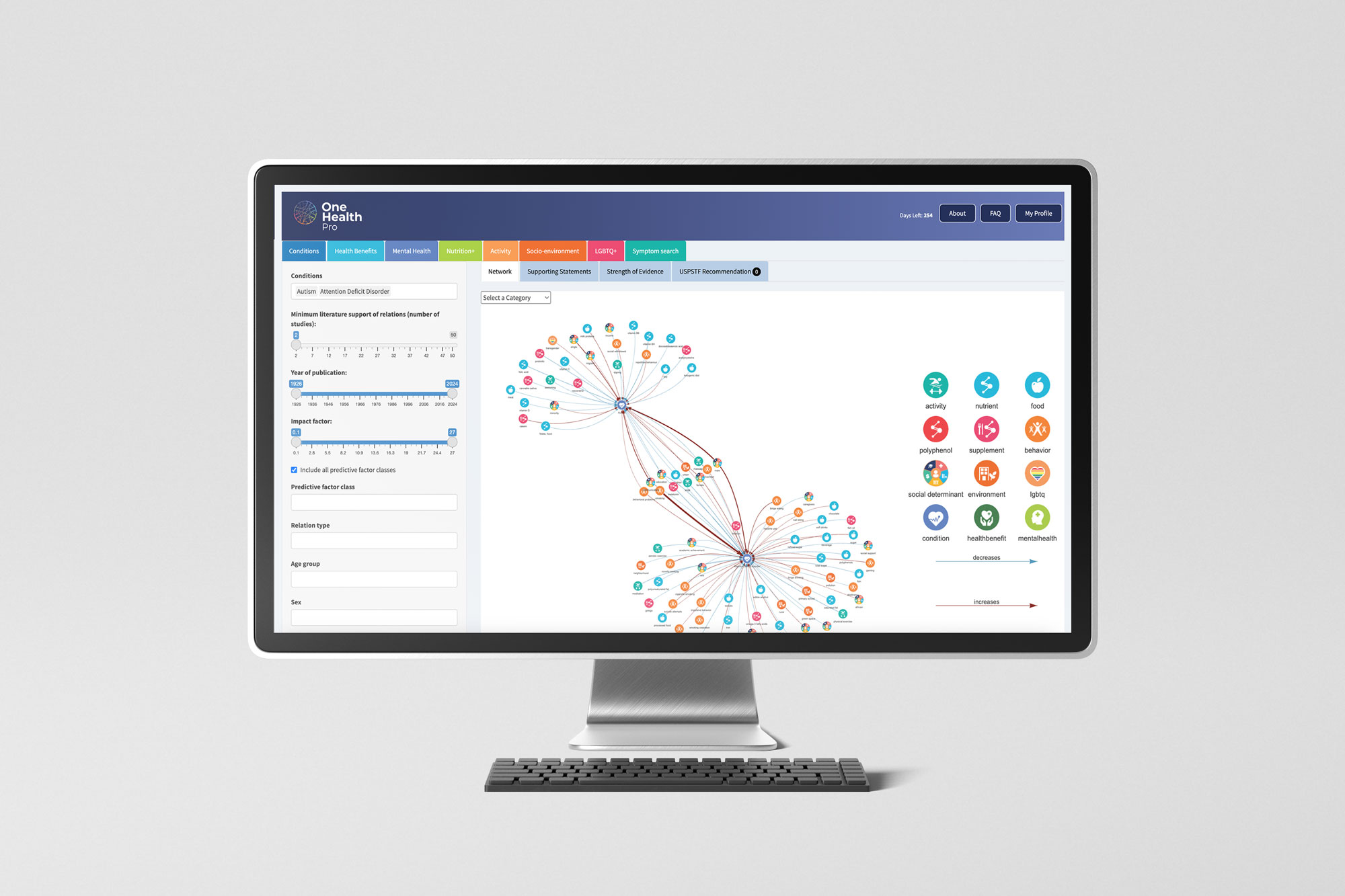Beyond Simple Choices
Too often, “lifestyle factors” is treated as a matter of simple choices—eat better, move more. But lifestyle factors are far more complex, and far more powerful.
They are the real-world conditions—both chosen and inherited—that shape how health unfolds, day by day, person by person. What you eat, how you move, the stress you carry, the air you breathe, the community you live in, the social supports you have, and whether healthy options are even within reach—all of these and more are lifestyle factors.
Some are decisions. Many are not.
At Vydiant, we treat these not as vague recommendations, but as data-rich, modifiable drivers of health. Our OneHealth platform maps their directional influence on almost 3,000 diseases and conditions, quantifies their effects, and layers on individual characteristics—such as age, sex, condition, environment, and life stage—to deliver personalized, precise guidance rooted in science.
The Fragmented Landscape of Health Determinants
The fragmented terminology around health factors reveals a deeper problem: our siloed approach to understanding wellness. Consider how these concepts are typically disconnected:
1. Health Behaviors
- Typically refers to individual actions like smoking, diet, exercise, or alcohol use
- Focuses on personal choices, often ignoring structural or environmental influences
2. Modifiable Risk Factors
- Emphasizes factors that can be changed to reduce disease risk (e.g., obesity, hypertension)
- Often used in clinical/public health settings, but feels medicalized or abstract for consumers
3. Social Determinants of Health (SDOH)
- Includes factors like housing, education, income, transportation, and access to care
- Recognizes non-medical, systemic contributors to health outcomes
- Sometimes treated as separate from “lifestyle,” though they are deeply interconnected
4. Environmental Exposures
- Includes pollution, toxins, noise, and other physical surroundings
- More commonly referenced in epidemiology or public health
5. Behavioral Determinants
- A broader, systems-level term used in health policy and social sciences
- Includes how behavior is shaped by context, incentives, or social norms
6. Life Circumstances
- A softer, more human-centered way to describe non-medical influences on health
- Often overlaps with SDOH but can include personal history, trauma, or caregiving responsibilities
7. Personal Health Practices
- Common in wellness circles. Usually refers to routines, habits, or choices people make
- Tends to exclude things like access, affordability, or systemic barriers
8. Psychosocial Factors
- Includes stress, social support, isolation, resilience, and emotional well-being
- Often considered part of lifestyle but not always labeled explicitly as such
9. Wellness Determinants
- Emerging term, especially in integrative and functional medicine
- Framed around optimizing health, not just avoiding disease
10. Whole Person Health Components
- Gaining traction in value-based care and lifestyle medicine
- Encompasses physical, emotional, social, and environmental dimensions
The Vydiant Solution: Reconnecting the Fragmented Health Landscape
These terms show how fragmented and siloed the conversation around “lifestyle” really is. One of Vydiant’s unique positions is the ability to reconnect these threads using evidence and AI—not just to describe them, but to map, analyze, and personalize their real-world impact.
The OneHealth AI platform transcends these artificial divisions by:
- Processing over 40 million scientific articles to identify connections across traditionally separated domains
- Analyzing 14,500+ unique health terms across 25 specialized categories
- Mapping 9,400+ evidence-based relationships between comprehensive lifestyle factors and health outcomes
- Quantifying the strength of evidence for each relationship
- Personalizing guidance based on individual characteristics and circumstances
Business Impact of a Unified Approach
For our partners across pharmaceuticals, food science, supplement development, and healthcare delivery, this comprehensive approach to lifestyle factors creates unprecedented opportunities:
- Enhanced R&D Efficiency: By understanding how environmental, social, and behavioral factors interact with pharmaceutical interventions, research becomes more targeted and effective.
- Personalized Product Development: Food and supplement formulations can address specific needs based on comprehensive lifestyle contexts, not just isolated nutritional factors.
- Improved Healthcare Delivery: Providers gain insights into the full spectrum of influences on patient health, enabling truly personalized care plans.
- Health Equity Advancement: By recognizing structural and environmental factors alongside individual choices, interventions can address root causes of health disparities.
The Path Forward: From Fragmentation to Integration
The future of preventive health depends on our ability to transcend the artificial boundaries between different types of health determinants. Vydiant’s OneHealth platform represents a pioneering approach to this integration—creating a comprehensive, evidence-based system for understanding and modifying the full spectrum of factors that shape health outcomes.
By redefining “lifestyle factors” as this comprehensive set of influences, we create new possibilities for both business innovation and health improvement across populations.
For partnership opportunities in advancing this integrated approach to precision health, contact Terry Carlone, CEO, at tcarlone@vydiant.com or 916.806.0209.
Using our Autism + ADHD use case, OneHealth AI identified:
Shared beneficial interventions across both conditions, like omega-3 supplementation, structured physical activity, and screen-time reduction.
Contradictory effects of certain dietary factors, helping providers and researchers understand where more nuance is needed.
Strength-of-evidence rankings across every relationship, making it easy to distinguish highly supported interventions from emerging or weak signals.
All in seconds. All with links to the original studies. All powered by our AI pipeline built on more than 40 million research articles, structured into a directional knowledge graph with over 9,400 evidence-based relationships.
For Clinicians, Researchers—and Investors
For clinicians, using our OneHealth Pro too (powered by OneHealth AI) means smarter consultations. Imagine being able to say to a caregiver:
“There’s strong evidence that massage therapy can reduce tactile sensitivity and improve emotional regulation in children with Autism and ADHD. Want to try integrating that?”
Your next treatment breakthrough might be a lifestyle factor you’re weren’t trained to recognize. This allows you to:
- Cut research time from hours to seconds.
- Visualize multi-factor interventions with strength-of-evidence rankings.
- Provide families with practical, evidence-backed options beyond prescriptions.
For researchers, using OneHealth Pro means faster hypothesis generation and validation. Instead of running endless Boolean strings in PubMed, you get immediate visibility into multi-factorial relationships—and clarity on where the evidence is strong, weak, or absent.
For investors, it gives you a glimpse at the future of precision lifestyle health—a platform that doesn’t just tell you what worked in one study, but what is likely to work for real people in real-world conditions.
This isn’t search. It’s accurate intelligence delivering curated, evidence-ranked, interconnected insight.
From a Search → to Precision Guidance
The Autism search demonstrates OneHealth Pro’s ability to:
Map positive and negative lifestyle-health relationships (such as ketogenic diets decreasing symptoms; soy-based infant formula increasing risk).
Reveal controversial or contradictory findings with full citation and strength-of-evidence transparency.
Surface non-obvious interventions (such as massage therapy, Qigong, swimming) that clinicians and caregivers may never encounter in standard care.
Support whole-person guidance by connecting diet, supplements, activity, and maternal behavior before/during pregnancy.
No other tool translates 40M+ studies into actionable, individualized insights like this.





